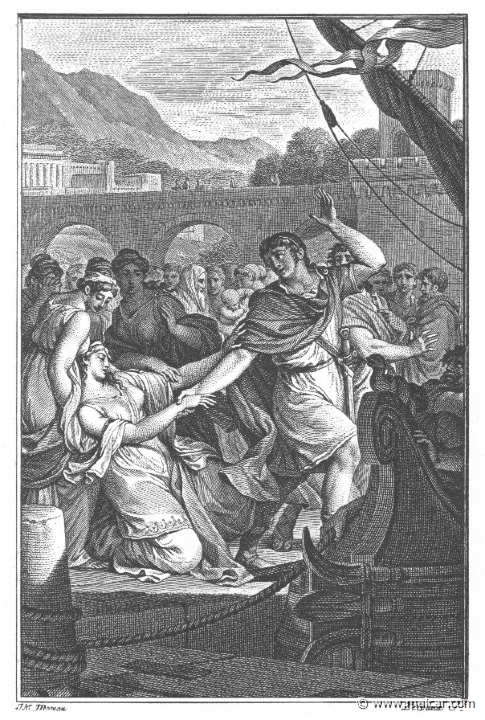|

|
Alcyone and Ceyx. "Alcyone fell to trembling again; her tears flowed afresh and, embracing her husband in the depth of woe, she said a sad farewell at last and then fainted away completely." (Ov.Met 11.458). Guillaume T. de Villenave, Les Métamorphoses d'Ovide (Paris, Didot 1806–07). Engravings after originals by Jean-Jacques François Le Barbier (1739–1826), Nicolas André Monsiau (1754–1837), and Jean-Michel Moreau (1741–1814).
|
|
King Ceyx of Trachis (a city in Trachinia in southern Thessaly) and his wife Alcyone 2 were turned, some say, into birds by Zeus, because of their
limitless pride. For Ceyx said that his wife was Hera, and Alcyone 2 said that her husband was Zeus.
But others have said otherwise:
Visits
To King Ceyx in Trachis came the exiled Peleus, who had been
expelled from Aegina by his father Aeacus after the death of his brother Phocus 3 (see also Psamathe 1 at NEREIDS). At this time, Ceyx was still mourning his brother Daedalion, who was turned by Apollo into a hawk. This Daedalion was known for harshness, eagerness of war, and readiness for violence. However, when his daughter Chione 2 (or perhaps Philonis) died, he could not find consolation, and kept ever bewailing his lost child. So finally, out of grief, he hurled himself from Mount Parnassus' top, and while he fell was turned into a bird. Also Heracles 1 came to Trachis, when after having accidentally killed the boy Eunomus 1, son of Architeles 2, he wished, in accordance with the law, to suffer the penalty of exile. It was in his way to Trachis that Heracles 1 felt compelled to shoot the Centaur Nessus 2, when he tried to violate Heracles 1's wife Deianira 1 while ferrying her across the river Evenus. Having arrived to Trachis, Heracles 1, assisted
by the Arcadians who accompanied him in his
campaigns, conquered the Dryopians, a people living
between the Sperchius River and Mount Parnasus, and
killed their king Laogoras. After several wars, Heracles 1 died in
Trachinian territory. But his sons, fleeing from Heracles 1's tormentor Eurystheus, who had
decided to banish the HERACLIDES from the
whole of Hellas, for he considered them a threat to
his throne in Mycenae,
were received by Ceyx for some time. But as Eurystheus demanded
their surrender threatening war, they had to left
Trachis and take refuge elsewhere. It is told that
Ceyx sent them to Athens,
arguing that he was weak but King Theseus was strong
enough to help them and oppose Eurystheus.
Fate of Ceyx
King Ceyx perished in a shipwreck when he was
journeying to the oracle at Delphi. He traveled
there, they say, on account of the strange things
that happened to his brother Daedalion, and also
because of other events that had taken place since
his brother's death. As the journey by land was unsafe because of the robbers in the region, he decided to sail. Alcyone 2, who feared the sea and loved her husband, tried to persuade him to stay, or at least to let her go with him. But Ceyx was unwilling either to give up his journey, or to take his wife with him. So when he launched his boat, she wept without consolation and fainted. Alcyone 2's fears and forewarnings proved to be true, for the vessel was shipwrecked, and Ceyx drowned while praying that the waves may bear his body into his wife's sight. During his absence, Alcyone 2 kept herself praying to Hera for the safety of her
husband, who was already dead. So Hera sent Iris 1, the messenger of
the gods, to Hypnos to ask him send to Alcyone 2 a vision in the shape of Ceyx to tell her the truth about his death. So Hypnos sent his son Morpheus, who imitates the human form, and he, taking the face and form of Ceyx, stood naked before Alcyone 2's bed and told her the truth.
Halcyon days
Alcyone 2 then went to the beach and there, having found her dead husband, teared her cheeks, hair, and garments, and leaped into the sea. But all of a sudden she was turned into the bird called halcyon, and her husband Ceyx came to life again transformed into the same bird. And so, they say, their love remained, and they
bred on a floating nest when the waves of the sea
are still for seven days in the winter. And that is
why, the sea being calm in those days, the sailors
call them "halcyon days", which proverbially have
come to be regarded as days of peace and happiness.
|